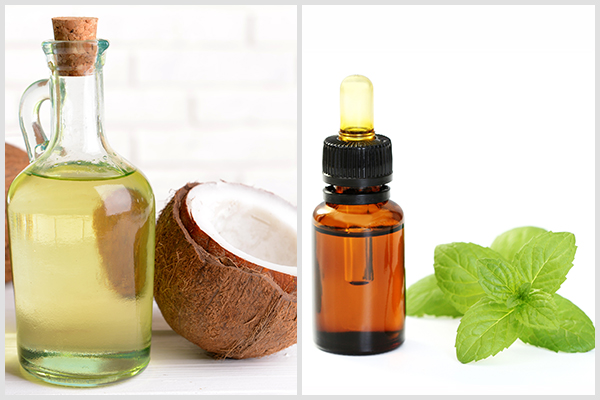In this article:
A stomachache can be uncomfortable and can disrupt your daily routine. While severe or persistent stomach pain requires medical attention, several home remedies may provide temporary relief for common stomachaches.

This article will explore natural remedies that you can try at home to soothe your tummy troubles.
Home Remedies for Pain in the Stomach
The following natural remedies can help relieve stomach pain and provide relief.
1. Massage with diluted peppermint oil

Numerous studies have shown that peppermint oil (PO) can significantly improve abdominal pain and other symptoms in patients with irritable bowel syndrome (IBS). Evidence from research supports the effectiveness of PO as a treatment option for IBS and it has a good safety profile.
So, PO can be a valuable remedy for alleviating stomachache and enhancing the quality of life of the affected individuals. (1)
How to use:
- Mix 1–2 drops of peppermint oil with a carrier oil such as coconut oil or olive oil. Gently massage the diluted peppermint oil onto your stomach area.
- Alternatively, inhale the aroma of peppermint oil.
2. Drink ginger tea daily
Ginger has been found to increase the rate of gastric emptying, which means it helps food move through the stomach faster. This can be beneficial if you have a stomachache caused by conditions such as functional dyspepsia.
Some studies suggest that combining ginger with other ingredients such as peppermint oil could potentially improve gastrointestinal symptoms. (2)
How to use:
- Obtain fresh ginger root from your local grocery store or market.
- Peel the ginger root and cut it into small, thin slices.
- Add the sliced or grated ginger to a cup of boiling water. Let it steep for about 5–10 minutes.
- Strain the ginger tea to remove the ginger pieces.
- Drink and enjoy!
3. Make chamomile tea
Chamomile, also known as German chamomile, is a plant that has been used for centuries to treat various ailments. It possesses anti-inflammatory properties that can help soothe and reduce inflammation in the stomach, providing relief from pain and discomfort.
Plus, it has relaxing effects that can help ease muscle spasms and cramps in the digestive system, thereby easing stomachaches.
You can enjoy chamomile in the form of a soothing tea or find it as an ingredient in natural remedies for stomach issues. (3)
4. Consume bananas
If you’re experiencing a stomachache, reach for a banana. Not only are they delicious, but they’re also easy to digest and can help soothe your discomfort.
Bananas have a natural antacid effect, which makes them great for relieving indigestion. Plus, their high potassium content can help increase mucus production in the stomach, which can prevent irritation of the stomach lining.
So, the next time your tummy is feeling off, try munching on a banana for some natural relief. (4)
Note: You can also try a BRAT diet, which stands for bananas, rice, applesauce, and toast. It’s a simple way to ease stomach upset. These food items are gentle on your tummy and can help settle it down. They’re easy to digest and provide some nutrients to keep you going. (5)

5. Enjoy aloe juice in the morning and at night
Aloe vera has some interesting properties that can soothe the tummy. Aloe vera gel has been found to have gastroprotective properties, meaning it can help protect the stomach from certain issues.
Research suggests that the administration of aloe vera can reduce the levels of gastric acid, which is often associated with stomach discomfort. (6)
So, if you’re experiencing a stomachache, give aloe vera a try. You can find aloe vera juice in some stores or grow your own aloe vera plant at home.
6. Incorporate basil into your diet
Did you know that basil, a popular herb, can actually help soothe a stomachache?
In India, people have been using basil seeds for ages to tackle digestive issues such as diarrhea and constipation. These tiny seeds work well by providing relief and helping regulate digestion. (7)
If you’re experiencing indigestion after a heavy meal, grab some fresh basil leaves. Chew on a few leaves, or better yet, make a comforting cup of basil tea.
7. Drink lemon water
Researchers have found that lemon juice, with its low pH, can have a positive impact on your stomach health and digestion.
When compared to plain water, lemon juice has been found to increase the volume of gastric contents in the stomach after a meal. This means that it can help speed up the process of stomach emptying, which may alleviate discomfort. (8)
Squeeze a lemon in a glass of water and drink it up!
8. Take a few drops of cumin essential oil daily
IBS is a common gastrointestinal disorder characterized by chronic abdominal pain and changes in bowel habits. While there are no specific treatments for IBS, there’s an interesting remedy you might want to consider: cumin extract.
In a study, patients who were given 20 drops of cumin essential oil daily reported a significant decrease in abdominal pain, bloating, and other gastric issues during and after the treatment with cumin extract. (9)
What’s great about cumin extract is that it’s not only effective but also affordable and easily available.

9. Eat yogurt with your meals
Consuming yogurt with Lactobacillus rhamnosus, a type of beneficial bacteria, can improve gastrointestinal integrity and may also help alleviate gastrointestinal symptoms, according to a study done on those taking antiretroviral drugs.
The consumption of probiotic yogurt was also associated with a lower incidence of fever, which can be a common symptom of stomach-related issues. (10)
10. Apply a caraway oil poultice
Applying a caraway oil dressing/paste (called a poultice) to the abdomen has been found to be effective in relieving symptoms of diarrhea-dominant IBS, in which abdominal pain is one of its well-known manifestations.
In a study, two-thirds of the patients reported the treatment as good or very good for their symptoms. (11)
How to use:
- Combine a few drops of caraway essential oil with a carrier oil such as coconut oil.
- Take a clean cloth and spread the caraway oil mixture onto it.
- Gently place the poultice directly onto the affected area.
- Leave the poultice in place for 15–30 minutes.
It’s important to note that oral administration of caraway oil is not recommended for children, adolescents, or pregnant and lactating women. (11)
11. Apply a warm compress
During a bout of stomachache, a warm compress can provide relief by reducing the intensity of the pain. The warmth helps to relax the muscles in the abdomen, easing the cramping or spasms.
In one study, a patient found some relief from holding a hot water bottle against her abdomen. However, if stomach pain persists or worsens, it’s best to seek medical attention to rule out serious underlying health issues. (12)
Professional Treatment for Stomachaches
Drugs such as antacids, H2 receptor blockers, proton pump inhibitors, and tricyclic antidepressants can be effective in relieving stomachache.
Techniques such as relaxation training, biofeedback, and hypnosis can contribute to the patient’s sense of well-being and control, potentially alleviating stomachache. (13)
In children, a common cause of abdominal pain can be not taking anthelmintics (medication for treating worm infections) on time. So, make sure your child is taking the medicine on time.
Note: If symptoms persist or there are significant psychological difficulties in the family, a referral to a psychiatrist may be necessary, especially if the patient is experiencing depression.
Preventing Stomachaches

Dealing with stomach pain can be a real bummer, but there are ways to prevent it from happening in the first place. Here are some simple preventive tips: (14)
- Instead of going for big meals, consume several small meals throughout the day.
- Avoid spicy foods, dairy products, and gas-inducing foods if they upset your stomach.
- Staying hydrated is key to overall well-being, especially for the digestive system.
- Exercise is fantastic, but it’s important to approach it wisely to avoid stomach pain. Before starting any new exercise program, consult your doctor.
- Always stretch before and after physical activity and listen to your body’s limits. Gradually build up your pace and intensity over time.
What Is Causing My Stomach to Ache?
Stomachaches can be chronic or recurring. Chronic abdominal pain (CAP) lasts for more than 3 months, while recurrent abdominal pain (RAP) occurs intermittently.
The causes of abdominal pain can include: (15)
- Acid peptic disease
- Peritonitis (inflammation of the abdominal lining)
- Mechanical obstruction of the digestive tract
- Colic (intestinal, biliary, and renal colic)
- Vascular disturbances causing abdominal angina or ischemia
- Abdominal wall issues such as hernia, trauma, and infection
- Referred pain from conditions such as pneumonia or heart disease
- Metabolic conditions such as diabetes and food poisoning
- Neurogenic causes such as herpes-zoster
It’s important to note that these are general causes of abdominal pain, and a proper medical evaluation is necessary to determine the specific cause in an individual.
Most-Asked Questions About a Stomachache
Does drinking warm water provide relief from a stomachache?
Yes, sipping warm water can help ease stomach discomfort.
Can I try using apple cider vinegar to alleviate a stomachache?
Some people find relief from drinking a mixture of 1 tablespoon of apple cider vinegar and water.
Is it advisable to avoid solid foods when experiencing a stomachache?
It’s best to stick to easily digestible foods such as toast or crackers until your stomach settles.
Final Word
Home remedies can be effective in providing relief from mild stomachaches. However, it’s important to listen to your body and seek medical attention if the pain persists or worsens. Remember to maintain a healthy lifestyle, eat mindfully, and stay hydrated.
If you experience chronic or severe stomachaches, consult a healthcare professional for proper diagnosis and treatment. Take care of your tummy to maintain a happy and ache-free digestive system!
- Was this article helpful?
- YES, THANKS!NOT REALLY


